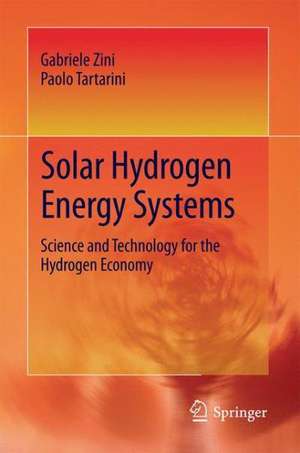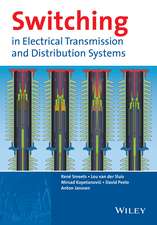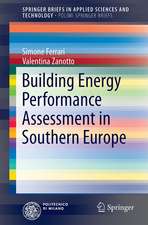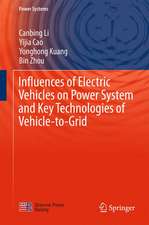Solar Hydrogen Energy Systems: Science and Technology for the Hydrogen Economy
Autor Gabriele Zini, Paolo Tartarinien Limba Engleză Paperback – 30 dec 2011
Preț: 891.33 lei
Preț vechi: 1086.99 lei
-18% Nou
Puncte Express: 1337
Preț estimativ în valută:
170.56€ • 178.52$ • 141.96£
170.56€ • 178.52$ • 141.96£
Carte tipărită la comandă
Livrare economică 31 martie-14 aprilie
Preluare comenzi: 021 569.72.76
Specificații
ISBN-13: 9788847019973
ISBN-10: 8847019974
Pagini: 204
Ilustrații: XVI, 184 p.
Greutate: 0.45 kg
Ediția:2012
Editura: Springer
Colecția Springer
Locul publicării:Milano, Italy
ISBN-10: 8847019974
Pagini: 204
Ilustrații: XVI, 184 p.
Greutate: 0.45 kg
Ediția:2012
Editura: Springer
Colecția Springer
Locul publicării:Milano, Italy
Public țintă
Professional/practitionerCuprins
Hydrogen.- Electrolysis and Fuel Cells.- Solar Radiation and Photovoltaic Conversion.- Wind Energy.- Other Renewable Energy Sources for Hydrogen Production.- Hydrogen Storage.- Other Electricity Storage Technologies.- Study and Simulation of Solar Hydrogen Energy Systems.- Real-Life Implementations of Solar Hydrogen Energy Systems.
Recenzii
From the reviews:
“Zini and Tartarini … provide a well-balanced overview of the hydrogen energy scene. … This ten-chapter book carefully explains the problems and the promise of this chemical as an energy source. … The book includes helpful comparisons of various fuel sources by cost, safety, ease of handling, weight, and availability. … Graphs, charts, photographs, and equations aid the serious student of this field. A list of references follows each chapter. Summing Up: Highly recommended. Lower-division undergraduates and above; informed general readers.” (J. C. Comer, Choice, Vol. 51 (1), September, 2013)
“Zini and Tartarini … provide a well-balanced overview of the hydrogen energy scene. … This ten-chapter book carefully explains the problems and the promise of this chemical as an energy source. … The book includes helpful comparisons of various fuel sources by cost, safety, ease of handling, weight, and availability. … Graphs, charts, photographs, and equations aid the serious student of this field. A list of references follows each chapter. Summing Up: Highly recommended. Lower-division undergraduates and above; informed general readers.” (J. C. Comer, Choice, Vol. 51 (1), September, 2013)
Notă biografică
Gabriele Zini is Chief Technology Officer for a leading investment firm in the renewable energy sector. He has worked in industry and energy for multinational companies, universities (ETH - Swiss Federal Polytechnic Zürich) and public organizations (CEA - Nuclear and Renewable Energy Commission, France). He publishes in international journals and books, serves as a reviewer for international energy journals, is a speaker at international conferences and has received an award for his research work. He holds a PhD in Advanced Materials Engineering and an MBA from Bocconi University (Italy).
Paolo Tartarini is Full Professor of Thermal Fluids and Energy Management at the University of Modena and Reggio Emilia. He is the director of the Interdepartmental Center of Innovative Technologies for Energy Efficiency (University of Modena and Reggio Emilia) and has served as secretary of Eurotherm from 1997 to 2002. He has been a partner in many international academic collaborations, mainly with the Departments of Mechanical Engineering and Fire Protection Engineering of the University of Maryland at College Park (USA). He is the author of more than 100 papers on international journals and conferences.
Paolo Tartarini is Full Professor of Thermal Fluids and Energy Management at the University of Modena and Reggio Emilia. He is the director of the Interdepartmental Center of Innovative Technologies for Energy Efficiency (University of Modena and Reggio Emilia) and has served as secretary of Eurotherm from 1997 to 2002. He has been a partner in many international academic collaborations, mainly with the Departments of Mechanical Engineering and Fire Protection Engineering of the University of Maryland at College Park (USA). He is the author of more than 100 papers on international journals and conferences.
Textul de pe ultima copertă
It is just a matter of time when fossil fuels will become unavailable or uneconomical to retrieve. On top of that, their environmental impact is already too severe. Renewable energy sources can be considered as the most important substitute to fossil energy, since they are inexhaustible and have a very low, if none, impact on the environment. Still, their unevenness and unpredictability are drawbacks that must be dealt with in order to guarantee a reliable and steady energy supply to the final user. Hydrogen can be the answer to these problems. This book presents the readers with the modeling, functioning and implementation of solar hydrogen energy systems, which efficiently combine different technologies to convert, store and use renewable energy. Sources like solar photovoltaic or wind, technologies like electrolysis, fuel cells, traditional and advanced hydrogen storage are discussed and evaluated together with system management and output performance. Examples are also given to show how these systems are capable of providing energy independence from fossil fuels in real life settings.
Caracteristici
Very few books on the subject
Very few books at this detailed level
Topic of increasing interest in the next coming years
Strong scientific and technology coverage
Includes supplementary material: sn.pub/extras
Very few books at this detailed level
Topic of increasing interest in the next coming years
Strong scientific and technology coverage
Includes supplementary material: sn.pub/extras













